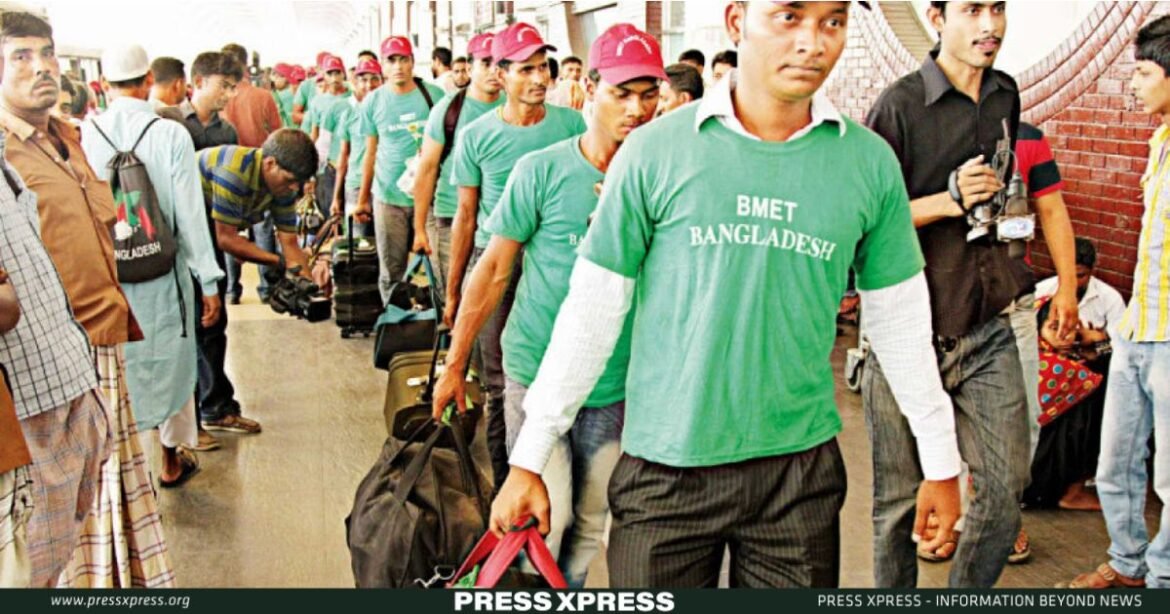- National Expatriates’ Day observed for the first time
- In 2021, expatriates garnered about Tk 233200 crores, which is 5.28% of the GDP
- Bangladesh ranked seventh in expatriate income in 2021
- 17.39% of expatriate income is allocated to land purchases
Approximately 13 million expatriates are employed in various countries worldwide, and their contribution to the development of Bangladesh holds significant importance, particularly highlighted during the economic challenges of the COVID-19 pandemic.
Contrary to national and international concerns, the hard-earned income of expatriates played a pivotal role as they sent a record number of remittances to Bangladesh amid the COVID-19 pandemic. Recognizing their substantial role and aiming to elevate their dignity, there was a demand for the Bangladeshi government to designate a special day for expatriates.
You can also read: Bangladesh’s Jute Industry Attracts Global Attention
In response to this demand, during a cabinet meeting on December 27, Prime Minister Sheikh Hasina approved December 30 as National Expatriates’ Day. This announcement marks a new milestone, providing expatriate Bangladeshis with a dedicated day and platform to address challenges related to their dignity and enhance their sense of pride.
On National Expatriates’ Day, the government of Bangladesh will implement special arrangements for expatriates and is expected to take a more proactive role in resolving their issues. With official celebrations commencing, this designated day is poised to play a significant role in addressing the grievances of expatriates in the years to come.
Role of Expats for the Development:
Expatriate earnings play a crucial role in propelling Bangladesh’s economic progress. In 2021, expatriates in Bangladesh garnered a total income of approximately Tk 2 lakh 33 thousand 200 crores, constituting 5.28 percent of the GDP. The expatriate income for 2022 reached Tk 222,600 crore, accounting for 4.55 percent of the GDP. Globally, Bangladesh ranked seventh in expatriate income in 2021, with a significant portion originating from countries such as Saudi Arabia, the United Arab Emirates, America, Kuwait, and the United Kingdom.
In the fiscal year 2019-2020, Bangladesh received repatriation income of Tk 42,451 crore, Tk 26,200 crore, and Tk 25,476 crore from Saudi Arabia, the United Arab Emirates, and America, respectively. According to a survey, 17.39 percent of the total expatriate income in Bangladesh is allocated to land purchase, 33.45 percent to investment, and 13.74 percent is saved.
The number of Bangladeshi workers going abroad decreased from about 7 lakh in 2019 to approximately 540 thousand in 2021. Analysis of diverse data indicates that a majority of Bangladeshi expatriates in the Middle East, including Saudi Arabia, Oman, the United Arab Emirates, and Malaysia, are categorized as unskilled labor. Their earnings primarily contribute to household expenses, significantly boosting the prosperity of our rural economy. Over the past 15-20 years, markets in various districts of Bangladesh have transformed, with the widespread sale of items such as air conditioners, refrigerators, and mobile phones.
Simultaneously, numerous business-minded individuals express interest in investing in Bangladesh due to its rapid economic growth. Investments by expatriates in England are evident in establishments such as Rose View Hotel in Sylhet city, Grand Sylhet Hotel, The Palace Resort in Bahubal, Habiganj, Baraka Power Limited Company in Sylhet, as well as various resorts, shopping malls, and hospitals. The government of Bangladesh has implemented several initiatives to attract the attention of affluent individuals residing in developed countries. Encouraging expatriates to invest by promoting diverse business ventures involving potential entrepreneurs residing in the country is essential.

Government’s Initiatives
The government’s efforts to boost foreign remittances extend beyond merely designating a national day for expatriates. Various initiatives have been undertaken to support expatriates, including:
Government Helpline 333
The government introduced the helpline 333 specifically for expatriates, allowing them to seek assistance through the popular instant messaging app ‘Imo’. The National Helpline 333 has proven instrumental in accessing crucial government services and information, especially during the challenges posed by the COVID-19 years.
The service incorporates AI assistance through the helpline, aiming to streamline public service delivery and enhance citizens’ access to essential government services.
Probashi Pension Scheme
The government has established a pension scheme for migrant workers, offering monthly installments of Tk5,000, Tk7,500, and Tk10,000. Migrants returning to the nation before the age of 60 can contribute in local currency or exchange the scheme, receiving their pension in local currency upon maturity.
This initiative aims not only to improve the standard of living but also to extend pension benefits to those aged 18-60 who previously may not have considered such schemes. The government will assist those identified as poor by contributing 500 Taka to the one-thousand-taka scheme.
Mobile Financial Services (MFS)
To facilitate remittances, the government allowed the mobile financial services (MFS) sector to process remittances, offering a more convenient and efficient alternative to traditional bank routes. Bkash, the market leader in the MFS sector with a broad network across the country, has emerged as a key facilitator for remittance operations since 2018.
Expatriates find relief in using MFS, as it eliminates the need to disrupt work schedules or travel to other locations for remittance formalities, enabling instant transactions through mobile phones and relevant apps.
Increased Incentives on Remittances
Expatriates now receive a five percent incentive on their remittances through legal channels, a notable increase from the previous government incentive of 2.5 percent. Banks will now provide an additional 2.5 percent incentive, enhancing the overall encouragement for expatriates to send their remittances through official channels.
Expatriates, regarded as valuable resources, possess the capacity to mold Bangladesh into a ‘Smart Nation.’ Their pivotal roles in transferring technology, fostering economic growth, establishing global networks, developing skills, and facilitating cultural exchange are essential for constructing a sustainable and technologically advanced society. As Bangladesh navigates the complexities and possibilities of the future, the dynamic engagement of its expatriate community is poised to be a pioneering force in actualizing the envisioned ‘Smart Bangladesh.’


